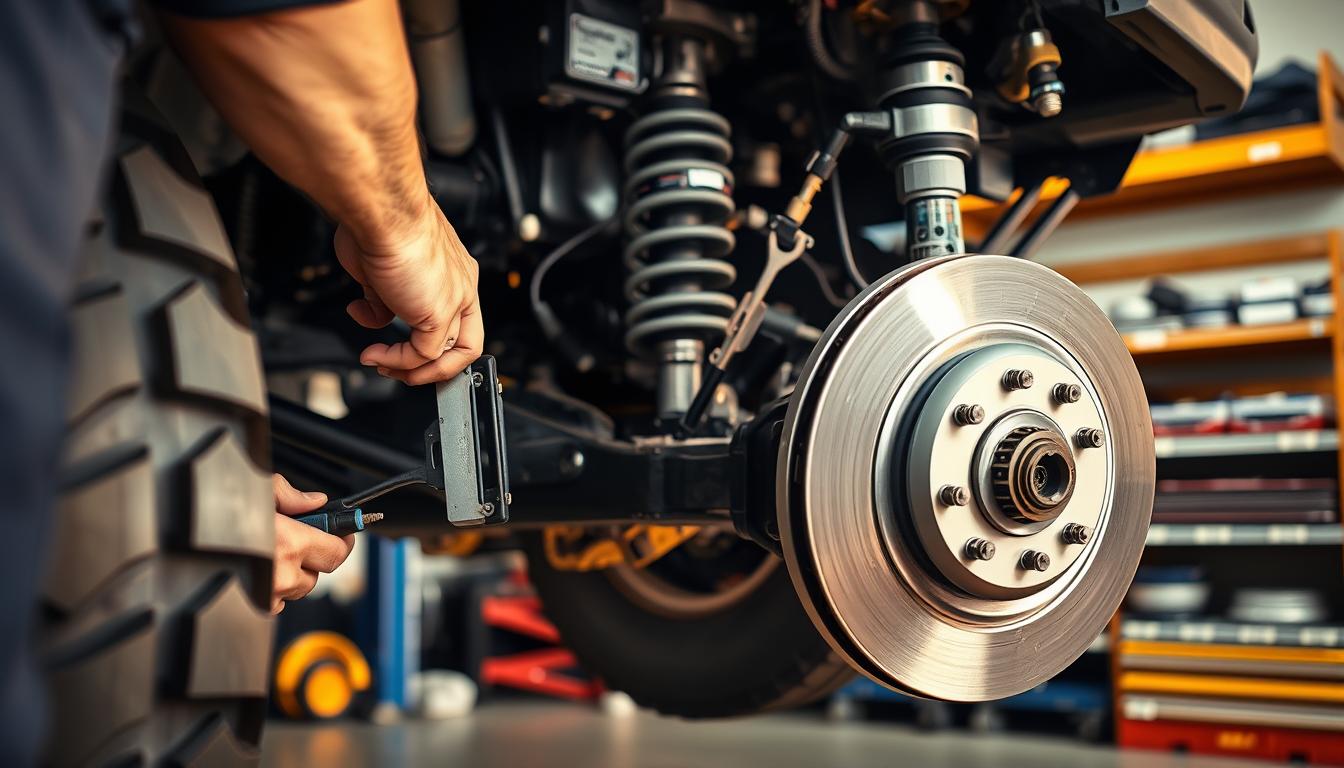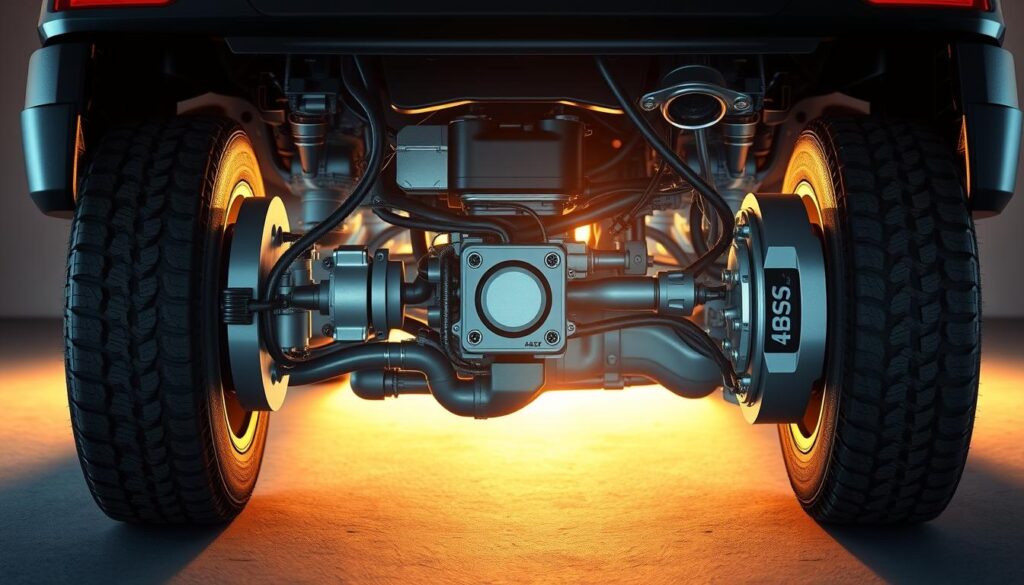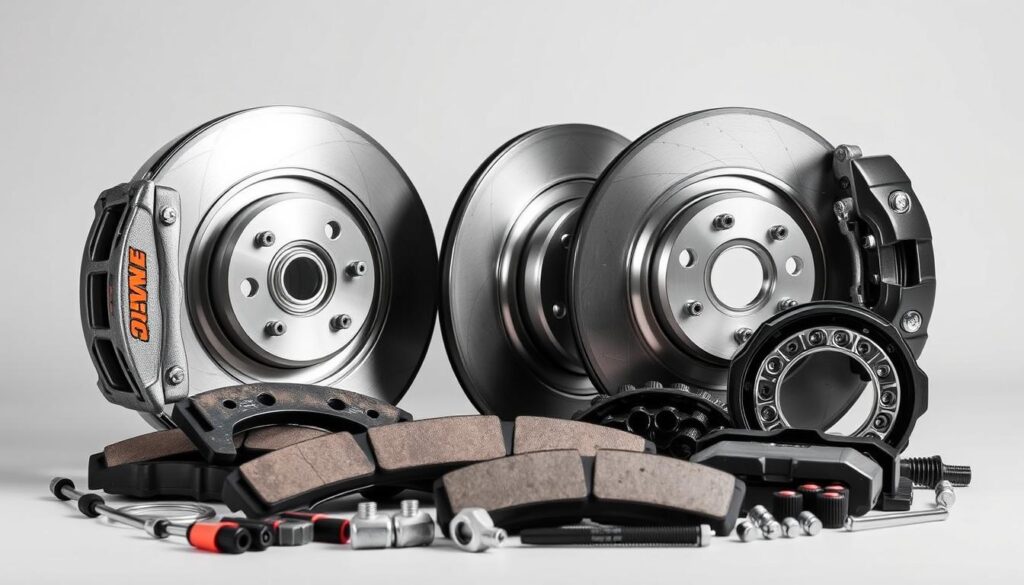How to Maintain Your 4×4 Braking System for Safety

Off-road adventures in your 4×4 are thrilling, but safety always comes first. A good braking system is key to avoiding accidents and keeping everyone safe.
Ignoring brake care can cause serious brake failure. This risk is high, putting everyone in the vehicle in danger. Regular checks and upkeep can stop such failures.
Knowing how important brake care is and sticking to a maintenance plan lets you enjoy off-road trips safely.
Key Takeaways
- Regular brake inspections are vital for safety.
- Neglecting brake maintenance can lead to brake failure.
- A well-maintained braking system ensures a safe off-road journey.
- Regular maintenance can prevent accidents.
- Prioritising brake maintenance is key for 4×4 owners.
Understanding Your 4×4 Braking System
Knowing how your 4×4 braking system works is key to keeping you safe on the road. It’s made up of many parts that work together. This lets your vehicle stop safely and smoothly.
Types of 4×4 Brake Systems
There are mainly two brake systems in 4x4s: disc brakes and drum brakes. Disc brakes are more common today. They handle heat better and brake more efficiently, even off-road. Drum brakes are less common but used in some rear brakes.
Choosing between disc and drum brakes changes how your 4×4 brakes and what maintenance it needs. Knowing which one your vehicle has is important for proper care and inspection.
Key Components of the System
The main parts of a 4×4 braking system are brake pads, rotors, calipers, and the master cylinder. Brake pads are vital for creating friction to stop the vehicle. Rotors are the discs that the brake pads press against to slow or stop. Calipers hold the brake pads and press them onto the rotors. The master cylinder turns the brake pedal’s pressure into hydraulic pressure to apply the brakes.
- Brake Pads: Wear out over time and need regular inspection.
- Rotors: Can become warped or excessively worn, requiring resurfacing or replacement.
- Calipers: Can become stuck or corroded, affecting brake performance.
- Master Cylinder: Essential for converting pedal pressure into hydraulic pressure.
How the Braking System Works
When you press the brake pedal, it activates the master cylinder. This sends hydraulic fluid through the brake lines to the calipers. The calipers then clamp the brake pads onto the rotors, creating friction to slow or stop your 4×4. This happens quickly and is vital for controlling your vehicle, even in tough driving conditions.
Regular checks and maintenance of these parts are essential for a working braking system. This includes looking for wear on brake pads and rotors, making sure calipers work right, and checking the master cylinder’s condition.
Importance of Regular Maintenance
Keeping your 4×4’s brakes in top shape is key for safety on and off the road. Regular checks not only make your brakes last longer but also lower the chance of brake failure. This is very important, as brake failure can be dangerous, even more so when driving off-road.
Why Brake Maintenance Matters
Brake maintenance is essential because it affects how well your vehicle can stop. Ignoring brake maintenance can cause brake pads to wear out, rotors to get damaged, and brake fluid to degrade. All these can lead to less effective stopping power. For 4x4s, which face tough conditions, keeping the brakes in good shape is critical.
Regular inspections can spot problems early. Checking brake pads, ensuring brake fluid levels are right, and looking for leaks are important. These steps help avoid the risks of brake failure.
Signs of a Failing Braking System
Spotting signs of a failing braking system is vital to avoid accidents. Look out for squealing or grinding noises when you press the brakes, vibrations through the pedal, and a spongy brake pedal. If you see any of these, get your brakes checked right away.
- Squealing or grinding noises when braking
- Vibrations or pulsations through the brake pedal
- Spongy or soft brake pedal
- Visible wear on brake pads or rotors
Impact on Vehicle Safety
The risks of a bad braking system are huge. Brake failure can cause accidents, putting everyone in your vehicle and others at risk. By focusing on brake maintenance, you keep your 4×4 safe for any drive, on or off-road.
For tips on 4×4 brake safety and help with maintaining brakes on off-road vehicles, talk to a mechanic who knows 4x4s. Regular upkeep and knowing your vehicle’s brakes well are the keys to safe driving.
Inspecting Brake Pads and Rotors
Checking brake pads and rotors is key for 4×4 brake maintenance. Regular checks spot problems early, keeping your vehicle safe.
How to Check Brake Pad Thickness
It’s easy to check brake pad thickness at home or with a mechanic. Remove the wheel to see the pads. Look for wear indicators to know when to replace them. If pads are too thin, they need to be swapped out.
For more tips on brake pad care, check out brake pad care and maintenance tips. They provide great advice on keeping pads in top shape.
Signs of Worn or Damaged Rotors
Worn or damaged rotors hurt your 4×4’s braking. Signs of worn rotors include a pulsating brake pedal or odd noises when braking. Look for excessive wear, scoring, or heat damage on rotors. If you see these signs, fix them quickly for your safety.
“Regular maintenance of brake components is key to ensuring the overall safety and performance of your vehicle,” says a leading automotive expert.
Regular checks on brake pads and rotors prevent brake failure. This keeps your 4×4 safe. Remember, looking after your brakes is about safety and keeping your vehicle in top shape.
Monitoring Brake Fluid Levels
For a 4×4 vehicle, checking brake fluid levels is key to keeping brakes working well. Brake fluid is vital for the braking system, helping to send pressure to the brake calipers. Without enough brake fluid, brakes won’t work as they should.
Importance of Brake Fluid in 4x4s
Brake fluid is essential for the brakes to function. It works under high pressure and heat, making it important to keep it in good condition. It also helps to keep brake parts lubricated and stops corrosion.
- Ensures smooth operation of the brake system
- Prevents corrosion of brake components
- Facilitates the transfer of pressure to the brake calipers
Regular checks of the brake fluid level can spot problems early. It’s also important to check the brake fluid’s condition. Bad brake fluid can cause brakes to fail.
How to Check for Leaks
Checking for brake system leaks is easy to do at home. Start by finding the brake master cylinder reservoir and checking the fluid level. If it’s below the minimum, there might be a leak.
- Inspect the brake lines and connections for signs of leakage or damage
- Check the brake calipers and wheel cylinders for any fluid leakage
- Look for any signs of moisture or staining around the brake components
If you think there’s a leak, get a professional mechanic to check and fix the brake system.
When to Change Brake Fluid
Brake fluid should be changed every 2-3 years, or as the vehicle’s maker suggests. Brake fluid can absorb moisture over time, which can lower its boiling point and cause brakes to fail.
“Regular maintenance of the brake fluid is critical for the safety and reliability of the braking system.”
Changing brake fluid means bleeding the system to remove air. This requires some knowledge and the right tools.
By keeping an eye on brake fluid levels and maintaining the brake system, you ensure your 4×4 is safe to drive, on or off the road.
Keeping Brake Lines in Good Condition
Brake lines are key to your 4×4’s braking system. Keeping them in top shape is essential for safe driving. They can get damaged, often during off-road adventures. This is because they face harsh conditions like rocks, mud, and extreme temperatures.
Signs of Brake Line Damage
Spotting brake line damage early is important. It can stop bigger problems from happening. Look out for:
- Leaks or drips of brake fluid
- Rust or corrosion on the brake lines
- Dents or kinks in the lines
- Visible signs of wear or damage
Regular inspections can catch these issues early. This keeps your 4×4 safe to drive.
Importance of Regular Inspections
Checking your 4×4’s brake lines regularly is vital. A mechanic can look for damage, corrosion, or wear during an inspection. They can also replace any damaged parts.
It’s recommended to check brake lines during routine maintenance or after tough driving. This way, you can avoid brake failure and keep your vehicle safe and reliable.
The Role of ABS in Your 4×4
ABS is key in your 4×4’s braking system. It stops wheels from locking up and keeps traction on different roads. This is vital for keeping control, mainly when braking hard or on slippery surfaces.

Understanding Anti-lock Braking Systems
The Anti-lock Braking System (ABS) stops wheels from locking up by quickly pulsing the brakes. This helps the driver keep steering control, avoiding skidding or losing control.
Key components of ABS include speed sensors on each wheel, a valve in the brake line, and an electronic control unit (ECU). The ECU checks each wheel’s speed and controls the valve to adjust brake pressure.
Common Issues with ABS
ABS can face some problems. Faulty wheel speed sensors are common, caused by dirt, debris, or damage. This can lead to the ABS warning light on the dashboard.
Another issue is ABS module failure, which can happen due to electrical faults or software glitches. Sometimes, the ABS system needs to be recalibrated or replaced.
Regular maintenance is key for ABS to work right. This includes checking wheel speed sensors for damage or debris and making sure the ECU has the latest software.
Seasonal Maintenance Tips
To keep your 4×4 safe to drive all year, it’s important to know how seasons affect your brakes. Each season brings its own challenges for 4×4 vehicles. By adjusting brake maintenance for each season, you can keep your vehicle safe to drive.
Preparing for Winter Driving Conditions
Winter can be tough on your 4×4’s brakes. Freezing temperatures and icy roads mean your brakes work harder. It’s vital to get them ready for the cold.
- Check your brake fluid: Make sure it’s good for cold weather and top it off if needed.
- Inspect brake pads and rotors: Look for wear and replace them if needed to keep brakes working well.
- Brake line inspection: Check for damage or leaks, as cold weather can make problems worse.
Importance of Summer Brake Readiness
Summer also brings challenges for brakes, like higher temperatures and dusty conditions. It’s important to make sure your brakes are ready for summer to keep your vehicle safe.
- Monitor brake temperature: Use engine braking on long descents to avoid overheating brakes.
- Keep an eye on brake dust: Dust can build up and affect how well your brakes work.
- Regular inspections: Check brake pads, rotors, and fluid often to keep everything in good shape.
By following these seasonal maintenance tips, you can keep your 4×4’s brakes in top shape. This way, your vehicle will be ready for any driving conditions.
Upgrading Your 4×4 Braking Components
Upgrading your 4×4’s brakes can make a big difference. It improves stopping power and reduces wear on parts. This is great for both off-road adventures and daily driving.
Benefits of Aftermarket Options
Aftermarket brake parts offer better durability and performance. They’re perfect for 4x4s that carry heavy loads or face tough conditions. These upgrades include:
- Enhanced stopping power, essential for safety
- Better heat dissipation, lowering brake fade risk
- Custom options to meet your driving needs
For example, high-performance brake pads cut down stopping distances. Upgraded rotors help manage heat, preventing brake fade during heavy braking.
Recommended Brands for Brake Upgrades
Picking the right brand for brake upgrades is key. Here are some recommended brands known for quality and performance:
| Brand | Product | Key Features |
|---|---|---|
| Brembo | High-Performance Brake Pads | Excellent stopping power, durable |
| EBC Brakes | Ultimate Brake Rotors | Superior heat dissipation, long-lasting |
| PowerStop | Performance Brake Upgrades | Enhanced performance, easy installation |
Exploring these aftermarket options and brands helps 4×4 owners upgrade wisely. It ensures proper care for 4×4 brakes and boosts 4×4 vehicle brake maintenance.

Seeking Professional Help
Keeping your 4×4’s brakes in top shape is key for safety. While you can do many things yourself, some jobs need a pro’s touch. Knowing when to get help is important to keep your vehicle safe, even when you’re off-roading.
When to Consult a Mechanic
Listen to your vehicle. If you hear grinding noises, feel vibrations, or have a spongy brake pedal, see a mechanic. They have the tools and know-how to fix problems, keeping you safe on the road.
Finding a Trusted Brake Specialist
Looking for a brake expert? Find someone with 4×4 and off-road experience. Check online reviews and ask for recommendations. Make sure they use quality parts. A good mechanic will give you a clear diagnosis and fix what’s needed, so you can drive with confidence.
FAQ
What are the signs that my 4×4’s braking system needs maintenance?
Signs your 4×4’s brakes need attention include spongy pedals and grinding noises. You might also notice longer stopping times. Regular checks can spot problems early.
How often should I check my brake fluid levels?
Check brake fluid every 6 months or during vehicle checks. Low levels can mean leaks or worn-out brakes.
Can I upgrade my 4×4’s braking components myself?
Upgrading brakes yourself is possible, but it’s safer to get a pro. A mechanic or brake expert can ensure it’s done right.
What is the role of ABS in my 4×4’s braking system?
ABS stops wheels from locking up during hard braking. It keeps your vehicle stable and safe. Regular checks are key to its effectiveness.
How do I prepare my 4×4’s braking system for winter driving conditions?
For winter, check brake pads and rotors, and ensure brake fluid is at the right level. Make sure ABS is working. Consider winter brake pads if needed.
What are the benefits of aftermarket brake upgrades?
Upgrades can make your brakes better, last longer, and be safer. Brands like Brembo, Ferodo, and EBC Brakes are good choices.
When should I consult a mechanic about my 4×4’s braking system?
See a mechanic if you notice brake wear, poor braking, or are unsure about maintenance.
How do I find a trusted brake specialist?
For a trusted brake expert, ask friends, check online, and look for certifications from groups like the Australian Automotive Aftermarket Association.





